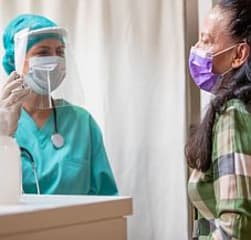Our Health Library information does not replace the advice of a doctor. Please be advised that this information is made available to assist our patients to learn more about their health. Our providers may not see and/or treat all topics found herein. The COVID-19 vaccine can help protect you from getting very sick from COVID-19. If you get COVID-19, your symptoms will probably be less severe than if you hadn't gotten the vaccine. You can't get COVID-19 from the vaccine. The number of doses you need can depend on your age, your health, which vaccine you get, and whether updated vaccines are recommended. Your doctor or pharmacist can tell you how to stay up to date. Everyone over 6 months of age should stay up to date on their COVID-19 vaccines. The vaccine is safe and effective at protecting people from serious illness and death. The vaccine is extra important for people who are at high risk for complications from COVID-19 if they catch it. It is also important for people who live with them. Some examples of people at high risk include those who: If you've already had COVID-19, you can catch it again. Getting the vaccine gives you extra protection. Getting vaccinated will help protect you from getting very sick from COVID-19. It will also help protect others around you, including people who are more likely to get very sick or die from COVID-19. If you get the virus, you could spread it to friends, family, and other people in your community—including those who are at high risk. The vaccine can help protect you and people you care about from other problems caused by getting COVID-19. This includes long-term health problems. It also includes missing work, school, or other events. And it includes the cost of health care if you are seriously ill. You might not have side effects. But if you do, they'll probably be like those of other vaccines, including: This is normal. Your body is building protection against COVID-19. You may also have other side effects, including: Side effects will likely go away in a few days. Until then, it may be harder to do your usual activities. If you think you've been exposed to COVID-19 or have symptoms like a cough, trouble breathing, or a new loss of smell or taste, call your doctor. These aren't vaccine side effects. You need a COVID-19 test. Current as of: September 28, 2025 Author: Ignite Healthwise, LLC Staff Current as of: September 28, 2025 Author: Ignite Healthwise, LLC Staff Clinical Review Board This information does not replace the advice of a doctor. Ignite Healthwise, LLC disclaims any warranty or liability for your use of this information. Your use of this information means that you agree to the Terms of Use and Privacy Policy. Learn how we develop our content. To learn more about Ignite Healthwise, LLC, visit webmdignite.com. © 2024-2025 Ignite Healthwise, LLC.Topic Contents
Vaccine to Prevent COVID-19
Overview

Who should get the vaccine?
Why should you get the vaccine?
What are the side effects of the vaccine?
How can you care for yourself after getting the
vaccine?
Related Information
Credits
Clinical Review Board
All Ignite Healthwise, LLC education is reviewed by a team that includes physicians, nurses, advanced practitioners, registered dieticians, and other healthcare professionals.
All Ignite Healthwise, LLC education is reviewed by a team that includes physicians, nurses, advanced practitioners, registered dieticians, and other healthcare professionals.
Our Health Library information does not replace the advice of a doctor. Please be advised that this information is made available to assist our patients to learn more about their health. Our providers may not see and/or treat all topics found herein. Current as of: September 28, 2025 Author: Ignite Healthwise, LLC Staff Clinical Review BoardVaccine to Prevent COVID-19
All Ignite Healthwise, LLC education is reviewed by a team that includes physicians, nurses, advanced practitioners, registered dieticians, and other healthcare professionals.



